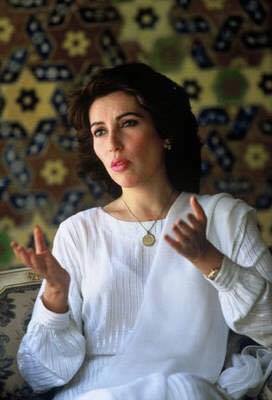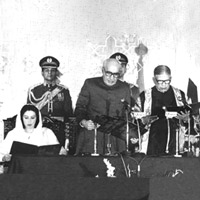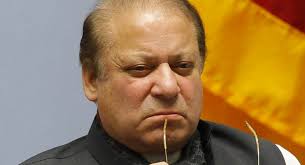It seems like yesterday but it was 27 years ago the same day when government of first ever elected female Prime-Minster of Pakistan and the Muslim world, Benazir Bhutto was dismissed on the charges of corruption and incompetence under Article 58-2(b) of Constitution of Islamic Republic of Pakistan.  The infamous and undemocratic Article was part of the Constitution at that times and granted powers to the President of the Islamic Republic to dismiss an elected government under any shady pretext. Ghulam Ishaq Khan, the President of that era used these discretionary powers two times within a period of mere 32 months to sack popularly elected governments of Benazir Bhutto and Mian Muhammad Nawaz Sharif respectively. Ghulam Ishaq Khan a man from Indian Civil Services (ICS) served at almost every imaginable post of civil services from 1947 to 1985 before being elected as chairman of the august Senate of Pakistan and eventually President of Pakistan from 17 August 1988 till 18 July 1993. Sometime jokingly referred to as “General Ghulam Ishaq Khan” as well, he symbolised the Establishment of the country that has the basic function of retaining and maintaining the status quo in the country. These guardians of the so called ideological frontiers of the state always treated the elected representatives of people of the country as their subordinates and they never even bothered to hide their feelings of contempt for the will of peoples of Pakistan.
The infamous and undemocratic Article was part of the Constitution at that times and granted powers to the President of the Islamic Republic to dismiss an elected government under any shady pretext. Ghulam Ishaq Khan, the President of that era used these discretionary powers two times within a period of mere 32 months to sack popularly elected governments of Benazir Bhutto and Mian Muhammad Nawaz Sharif respectively. Ghulam Ishaq Khan a man from Indian Civil Services (ICS) served at almost every imaginable post of civil services from 1947 to 1985 before being elected as chairman of the august Senate of Pakistan and eventually President of Pakistan from 17 August 1988 till 18 July 1993. Sometime jokingly referred to as “General Ghulam Ishaq Khan” as well, he symbolised the Establishment of the country that has the basic function of retaining and maintaining the status quo in the country. These guardians of the so called ideological frontiers of the state always treated the elected representatives of people of the country as their subordinates and they never even bothered to hide their feelings of contempt for the will of peoples of Pakistan.
 Much has been discussed, written and analysed about the role of Establishment and the Deep state in the post-colonial countries like Pakistan and their time-tested tactics to retain their iron hold over the power of the state and deny the people’s mandate. Their obsession with the iron hold isn’t for its own sake but it is the main weapon that serves them to control the resources of the state as well. As the ancient phrase goes ‘A fish rots from the head down’, they are in fact the originators of the same corruption and lawlessness they blame civilian governments for. As the students of political science and the political workers know very well that proverbial monopoly on violence is a core concept of modern public law. But this monopoly is fundamentally embedded in the legitimacy of the monopoly- holder. Without constitutional, legal and moral legitimacy, the use of physical force or other methods of coercion are nothing but a reign of terror. In the context of our country it is only the Constitution of Islamic Republic of Pakistan that grants such legitimacy through none else but the elected representatives of the people of Pakistan, or the Parliament of Pakistan in other words.
Much has been discussed, written and analysed about the role of Establishment and the Deep state in the post-colonial countries like Pakistan and their time-tested tactics to retain their iron hold over the power of the state and deny the people’s mandate. Their obsession with the iron hold isn’t for its own sake but it is the main weapon that serves them to control the resources of the state as well. As the ancient phrase goes ‘A fish rots from the head down’, they are in fact the originators of the same corruption and lawlessness they blame civilian governments for. As the students of political science and the political workers know very well that proverbial monopoly on violence is a core concept of modern public law. But this monopoly is fundamentally embedded in the legitimacy of the monopoly- holder. Without constitutional, legal and moral legitimacy, the use of physical force or other methods of coercion are nothing but a reign of terror. In the context of our country it is only the Constitution of Islamic Republic of Pakistan that grants such legitimacy through none else but the elected representatives of the people of Pakistan, or the Parliament of Pakistan in other words.
Hence every creature big and small in this country must be agreeing to these two points:
1). Source of all the legitimacy of the state is the will of people that is manifested through the Constitution of the country and the Parliament;
2). Despite being very clear about what is granted through written words, the idea of yielding their powers to civilian representatives, especially the practice of utilization of state’s powers, its coercive hand in particular, is not much acceptable to the non-elected functionaries of the state. In other words, the transfer of power to the people of Pakistan is still an unrealised dream and the powers that be would go to every extent to prevent it happening. Moral or legal sermonising would not serve any purpose here as it is a matter of human instinct also; nobody ever wants to cede the power and authority he/she is enjoying, so easily.
That is the scenario the generations of Pakistanis have been witnessing in the last 70 years now. The basic script remains unchanged and only some minor modifications are made every time just to accommodate the new entrants to the game of musical chairs called elections and democratic governance. An ordinary citizen, like this scribe, that wants to see his/her motherland prosper and flourish among the comity of the nations, doesn’t find any attraction in the game. Rather he/she feel deserted and betrayed same like the small children of a dysfunctional family that have nothing to watch at home but the rows and arguments of the parents. These children develop a deep sense of insecurity, fear and sometimes feeling of hate for other. These emotionally deprived children do not how to engage in rational conversation, how to assert themselves with self-confidence and respect for other’s point of view. They might escape from looming realities, resort to violence or truancy instead of engaging meaningfully in the prevailing circumstance. That is what we are in a huge family of around 220 million.
Finally a few words to the political elite of the country; as almost everybody among them is well aware of the game and their intended role in it. What have they done so far to change the game plan? What are their contributions for assertion of civilian authority? We don’t see much of mention-worthy serious efforts in the right direction since the promulgation of the Constitution of Islamic Republic of Pakistan in August 1973, except some sporadic and impulsive tries like Charter of Democracy or inclusion of Eighteenth amendment in the Constitution.
 The present phase we are witnessing since May 2013, presents a very horrifying scenario for the near future. A person that claims to be a man of crises although de-seated as Prime Minister was the suitable and seasoned person to steer the nation towards a positive direction, setting aside the tug of war between elected and non-elected centres of power of governance and the state but alas he wasted some very precious years in covering and justifying financial misappropriations of his family and cronies. Serious realisation of the precarious position of the civilian dispensation in the power structure of Pakistan is a great challenge for all the political players of the country. They need to run against the time but unluckily we don’t see any sign of realisation of the gravity of situation, let alone any on the ground action.
The present phase we are witnessing since May 2013, presents a very horrifying scenario for the near future. A person that claims to be a man of crises although de-seated as Prime Minister was the suitable and seasoned person to steer the nation towards a positive direction, setting aside the tug of war between elected and non-elected centres of power of governance and the state but alas he wasted some very precious years in covering and justifying financial misappropriations of his family and cronies. Serious realisation of the precarious position of the civilian dispensation in the power structure of Pakistan is a great challenge for all the political players of the country. They need to run against the time but unluckily we don’t see any sign of realisation of the gravity of situation, let alone any on the ground action.
Tanvir Afzaal is a London based Pakistani Writer and activist. His keen interests are politics, democratic struggles and military rules in Pakistan. His upcoming book “Recurrent Affairs; Pakistan” is soon to be published.



